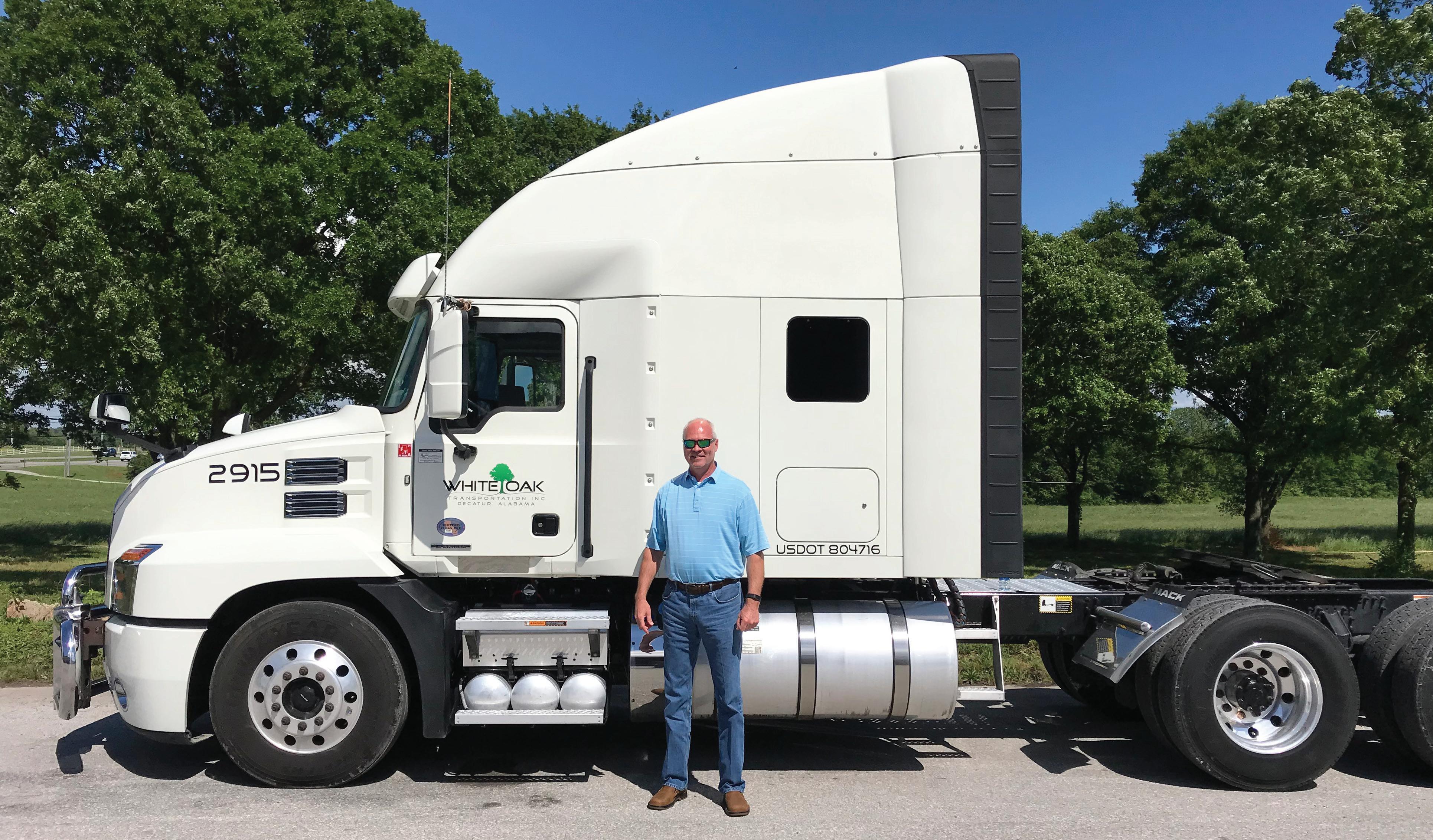
21 minute read
On Business
Pandemic pivot
How the Mack Uptime Center continued its critical customer service despite COVID-19 obstacles
By Aaron Marsh
When COVID-19 restrictions hit businesses in spring 2020, Mack Trucks had a complicated imperative: Keep the Uptime Center up and running, all while following the rapidly changing COVID-19 guidelines. No small ask, considering the Mack Uptime Center in Greensboro, North Carolina, is open 24 hours a day, seven days a week, 365 days a year, and is crucial to the smooth operation of Mack customers.
While planning for the unexpected is part of the Uptime Center’s mission, this global pandemic was unlike anything they had faced previously. However, the center’s disaster plans provided the framework for a successful pivot and the severe weather playbook was converted into an action plan.
“We’re continually providing support for a breakdown event or an unplanned event for our customers,” says Kim Skrzecz, director of uptime support at Mack. “And then, suddenly, we’re hit with the consequences of working in a pandemic environment.”
Early days
Skrzecz says that because they already had weather-related procedures on hand meant Uptime Center employees were primed to work remotely. Much of what was needed to satisfy COVID-19 remote work requirements was was already in place, but they still had to figure out how to succeed in the long term.
“We had to pivot quickly, to set agents up to support the customer and be able to provide continued and uninterrupted support for the customer during those initial days of COVID-19,” Skrzecz says.
“Some of the challenges that we faced revolved around equipment and potential Internet outages,” she notes. “We sent agents home with extra equipment, and our IT team had to mobilize to make sure we had proper resources.” She says operations managers helped drive equipment out to agents’ homes, all while everyone was observing proper personal protective equipment (PPE) and social distance protocols at those equipment handoffs.
“In a very short amount of time, we all had to leave the building, go home, make sure we were equipped to take calls from home, make sure we were equipped with backup equipment as needed — whatever that looked like — and get support from our IT department, again remotely,” Skrzecz says.
“We were doing a lot of driving of equipment out to agents to make sure that they could maintain the level of support that our customers need, on the phone and working in cases,” she recalls. The objective was “to keep everyone safe but also address the need of being able to work from home in the event of whatever equipment failure or Internet outage that we might face,” Skrzecz says. “And we enacted contingency plans along with backup plans.”
The Mack Uptime Center provides an array of services for customers, including working with a number of vendors to provide towing and roadside repair services. The collaboration with vendors led to some difficulties in the COVID-19 era.
“There were times that vendors were no longer allowing drivers to ride with them to complete a tow service, for instance,” Skrzecz says. “So, we had to act as a liaison between the customer and the vendor and the driver onsite to make sure that those drivers were taken care of. We reached out, contacted the customer team and tried to set that communication between all parties to make sure that the driver would be taken care of.”
The COVID-19 backdrop also made things more complicated dealing with tow, repair and other vendors that work with the Uptime Center, since those businesses saw some detrimental effects just as other sectors did.
“There were times, particularly early on when states were shutting down, that it was very difficult to get vendors out for services,” Skrzecz says. However, due to their extensive preferred vendor network they were able to work through most of those issues. She says the vendors certainly did their part as well to offer support. They communicated via text and calls with the drivers as they remained in their trucks.
As well as the Uptime Center may have been able to adapt during the COVID-19 pandemic, the center’s collaborative philosophy may not be as well fulfilled in a remote work scenario, says Magnus Gustafson, vice president of aftermarket quality and operations at Mack.
“Our Mack OneCall team is designed as a customer-facing group, all sitting together,” he explains. “And they are essentially surrounded by other experts in various departments and are within arm’s reach from the warranty team, the technical support team, and within arm’s reach from the reliability group that looks at product issues and so forth. So, having access to all these people within a quick ‘get out of the chair and ask a question,’ that’s kind of the concept of the Uptime Center.”
While that in-person collaboration was not available at the time, the center managed to get through the worst of it because of the history of working well together.
Magnus Gustafson, vice president of aftermarket quality and assurance for Mack Trucks
“We’re mostly still working remotely,” Skrzecz says, though now some limited onsite work is being conducted at the Uptime Center. Gustafson says he believes the Uptime Center will eventually return to more normal operations, though it may be a hybrid situation. The center has made the most of the pandemic situation in the meantime. “I think the spirit and the intent of how we operate has been maintained throughout, whether we were physically or remotely located next to each other,” Gustafson says. The point, he notes, is to “ensure that these resources are available to be pulled in to solve customer issues in real time.”
While converting the Uptime Center to a fully remote operation took ingenuity and unearthed some challenges, the center’s hard work was evidenced in service numbers. “At the beginning of the pandemic, we rose to the all-time highest number of customer rating,” Skrzecz says. “I think that speaks volumes to what the customers were experiencing on the other end — that continued support — as they themselves were facing uncertainty and the impact of COVID-19.”
The customers agreed that the Uptime Center functioned with their best interests during a difficult time. In fact, Skyrecz says they received a flood of positive comments from customers who expressed how appreciative they were that “we were still working and available to support them.”

Director of uptime support Kim Skrzecz, left, and training delivery specialist Justine Kelly review a customer support case at the Mack Uptime Center in Greensboro, North Carolina, in March 2021.
Adding Anthems

Reliable Carriers’ drivers appreciate increased comfort and safety with Mack Anthem®
Story by Carolyn Mason Photos by Kirk Zutell
When Justin Henderson, secondgeneration leader of Reliable Carriers, saw the Mack Anthem® at an industry trade show, his interest was piqued and he decided to buy five 2019 models to add to his family-owned Manchester, Tennessee-based fleet.
These were Reliable Carriers’ first over-theroad Mack® trucks. Once they arrived, the process of evaluating the new purchases began. They took a hard look at criteria such as cost of ownership, fuel efficiency, maintenance, safety and dealer relationship. But one of their top criteria was driver acceptance, and that’s where the Anthem really stood out.
Ryan Mabe, manager of Reliable Carriers, says he’s always interested in what drivers have to say about the equipment — and they were completely sold on the new Mack Anthems.
“Drivers are always concerned about what

the truck looks like. And then, if you can take what it looks like and mesh that with the creature comforts and then also the performance on the road, it serves as a recruiting tool — because if you can get all those at the highest level, then it’s going to draw people in,” Mabe says.
Mabe, who came to Reliable Carriers from the finance and banking industry, puts stock in driver opinion, but he’s also committed to making fact-based decisions on an investment as large as a new truck. The company operates 107 trucks and nearly 350 dry van trailers and employs 83 drivers. The five new Anthems were an immediate hit but still had to pass muster with all the criteria before they eventually ordered 10 more 2021 Anthems — and recently placed another order for an additional 10.
The new Anthems look professional with their Glacier White paint, and powered by MP®8 445 hp Super Econodyne engines and Mack mDRIVE™ 12-speed automated manual transmission with grade gripper. The Anthems are SMARTWAY certified with a full aerodynamics package. Safety features include Bendix Fusion 2.0 and disc brakes, while the units are also equipped with Mack’s Over The Air software and parameter remote download technology.
The driver-popular interior is a 70-inch stand-up sleeper, with premium steel-gray interior trim, upgraded matching seats, power mirrors and windows, SiriusXM, refrigerator prep, full-size bunk and blackout curtains over windshield, window and sleeper.
“Mack trucks continue to be dependable within our fleet with drivers praising each newer model more and more. Whether it is the handling, the improved interior creature comforts, or simply the stylish profile on the Mack Anthems; these trucks are becoming one of the most popular trucks in our fleet,” Mabe says.
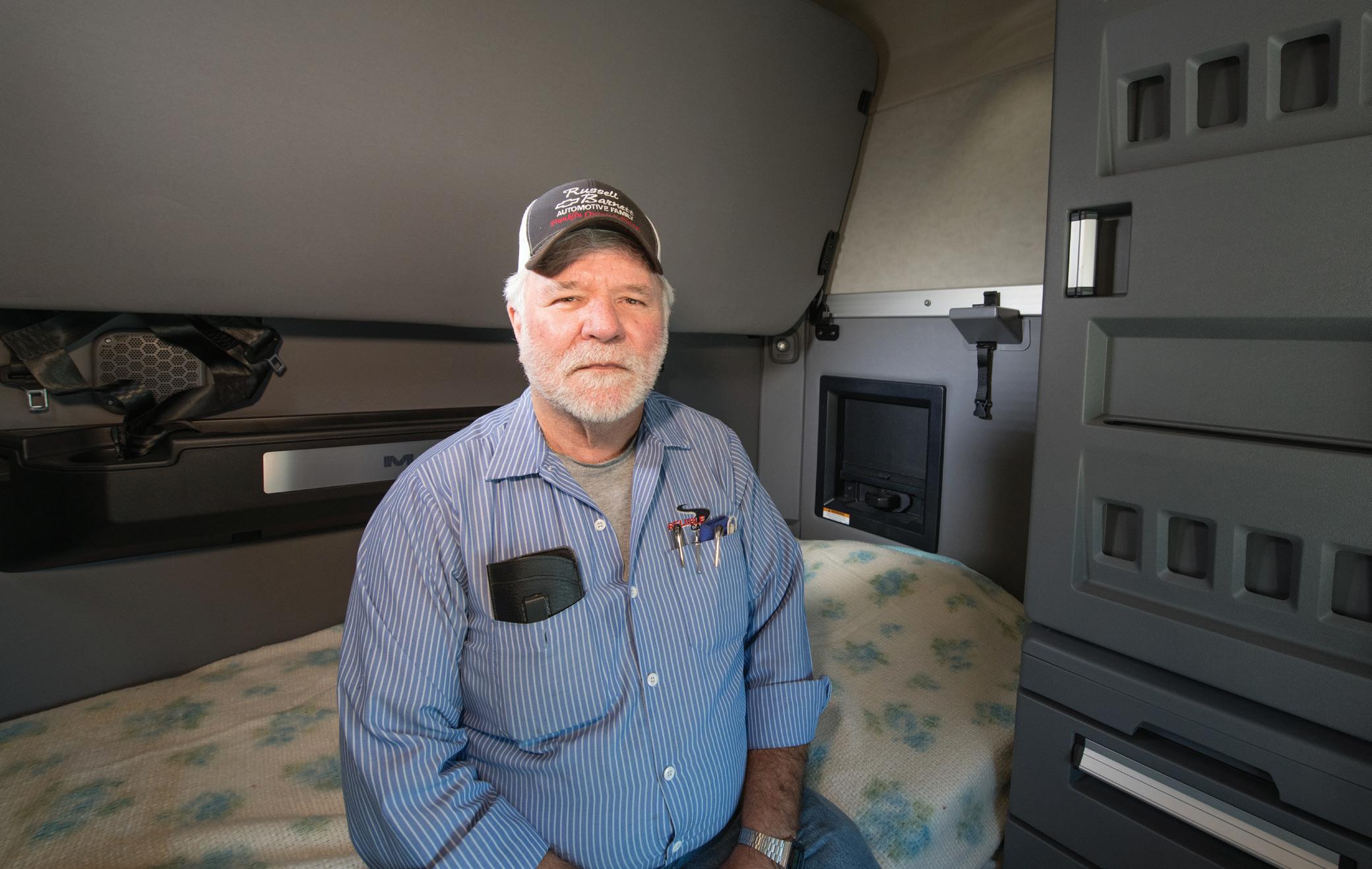
Johnny Bragg, company driver for Reliable Carriers, loves the comfort and power of the Anthem.
The purchasing process
Mabe says they typically try to turn over trucks every five years and trailers every 10 to 15 years. When making a new purchase decision they run through a detailed process, including creating spreadsheets to monitor costs such as fuel and maintenance and information such as warranty data and driver acceptance. He says he values the services
David Steele has been a company driver for Reliable Carriers for 12 years.
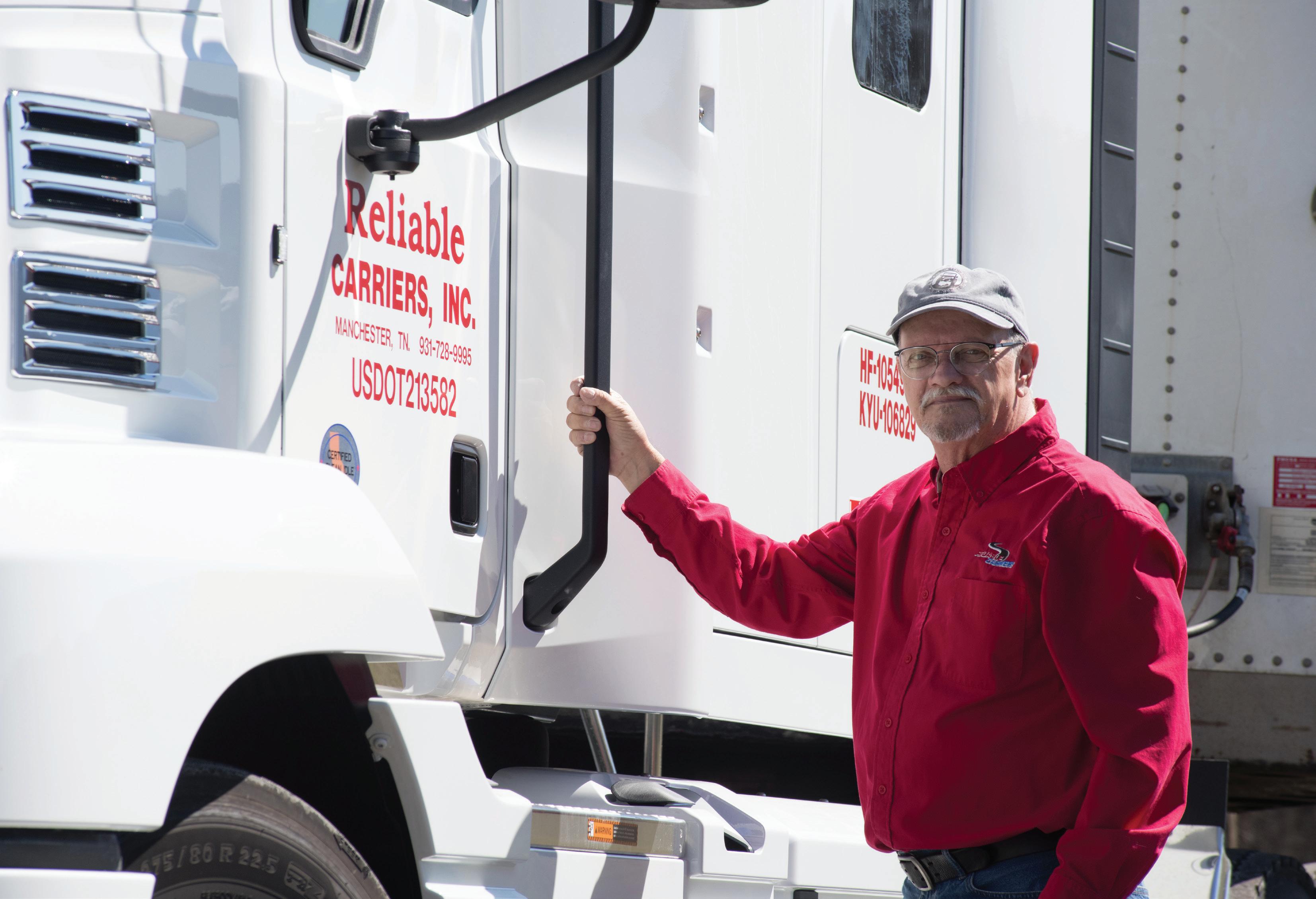
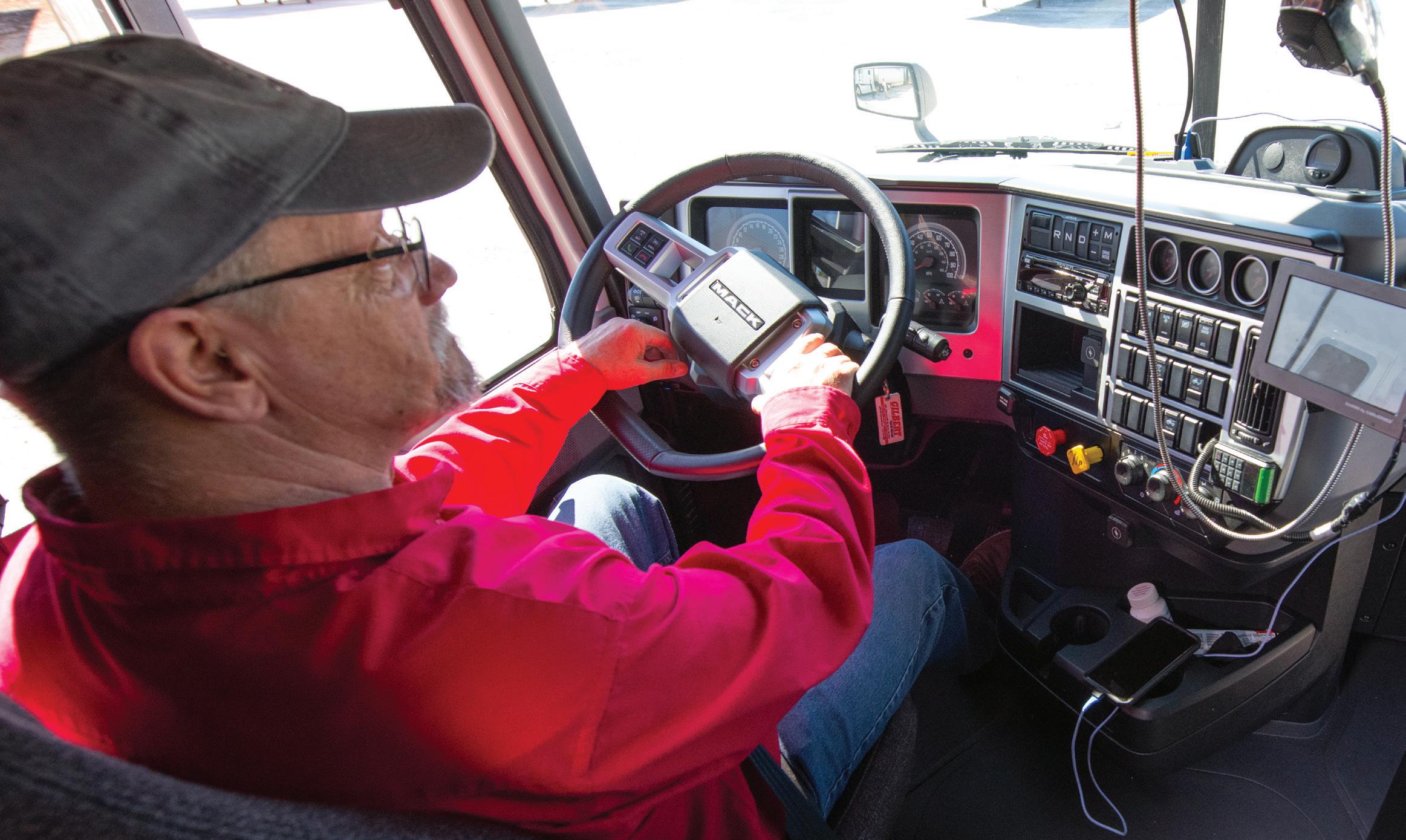
such as Mack OneCall™ that keep the trucks rolling and reduce costly downtime.
“Because Mack wasn’t known as having an over-the-road truck, this was an unexpected chance to really look at the Anthems and a chance to grow our partnership with McMahon Truck Centers-Nashville,” Mabe says. Jeff Tilley, the general manager, and Nick Triola and the sales team get Mabe’s praise. “They’ve taken care of and won us over.”
Triola says that relationship is key to the continuing opportunity to supply and spec Anthems for Reliable Carriers. “Our relationship with Reliable Carriers is really a strong one. This is a relationship business, and earning trust is a big factor for us. It takes time to earn trust. For us, it’s a partnership and we love that,” Triola says.
Fuel economy and driver acceptance


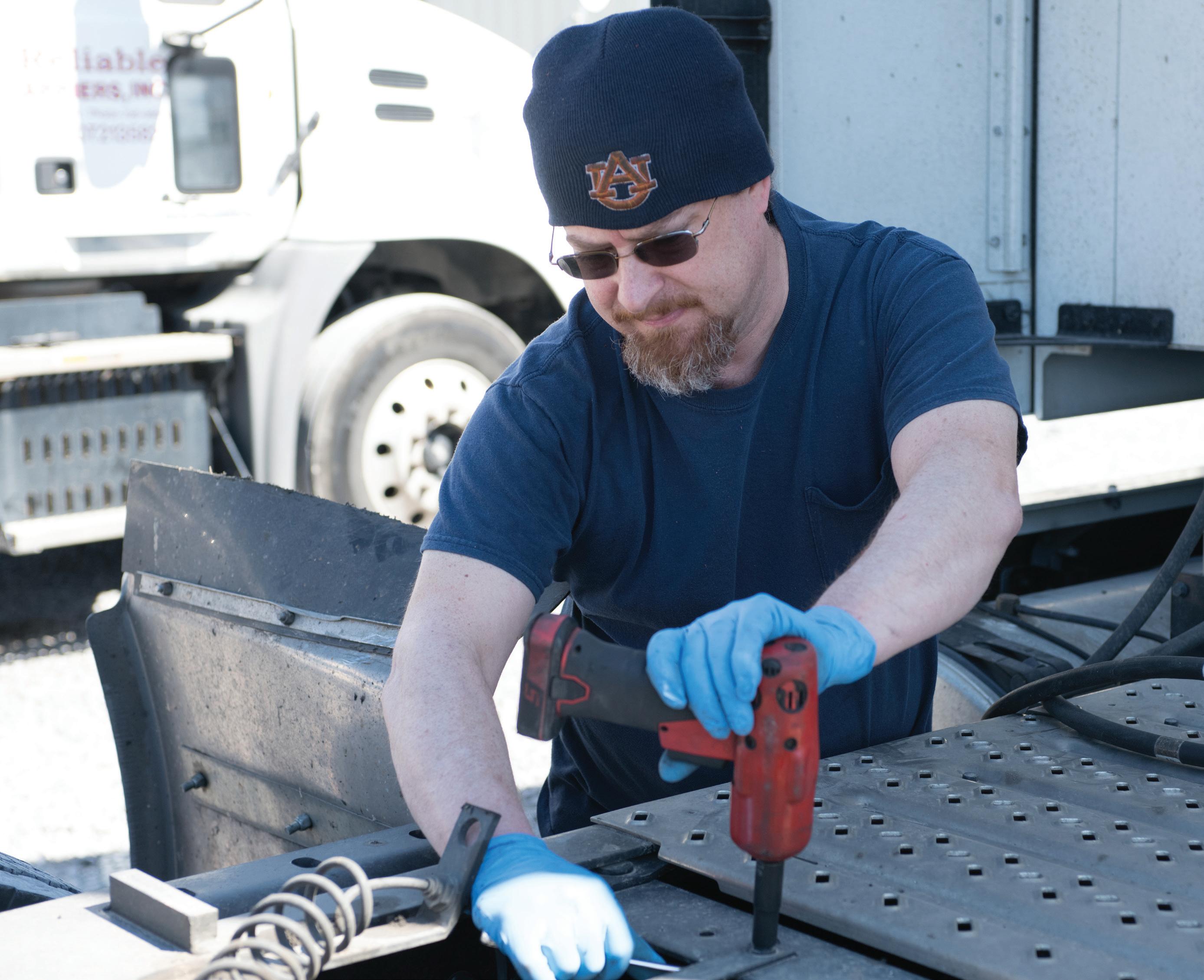
Fuel economy is critical for the profi tability of the company and for the drivers who want to earn their fuel bonus.
Mabe says they evaluate fuel effi ciency on a weekly basis. “In fact, the numbers came in for the newest 2021 Mack Anthem, and they are averaging 7.3 mpg, compared to our other OEM that’s getting roughly 7.0 mpg. Many of our over-the-road Anthem trucks average in the 7s on miles per gallon with the highest at 7.82 mpg. Our local and dedicated Anthem trucks are very close to 7.0 mpg. That’s something that fi ve years ago we would have never expected,” Mabe says.
In addition to the spreadsheets, Mabe believes that talking to the drivers is one of the best ways to make the fi nal decision about the pros and cons of all the equipment. “For me, being new to the industry and being asked to monitor the specs and to make recommendations, there’s no better person than someone who’s spending six days a week in the truck.”
Drivers overwhelmingly report that they enjoy driving the Anthems and note that they like the exterior look and the interior creature comforts. “They gave positive feedback on the way the truck handled, the power that the engine was putting out, and how comfortable the mattress and steering wheels were,” he says.
“Just the feel, sitting in the cab. Everything is right there around the driver in that cockpit of the truck, so just convenient. Steering wheel controls at their fi ngertips, they could tell that truck was built around an OTR driver,” Mabe says.
Driver feedback
David Steele, a driver for Reliable Carriers since 2009, says he loves the maneuverability and power of the truck. “When other drivers see it, they always comment that it’s a sharp truck. I like how Reliable Carriers keeps us in such good equipment and recommend other drivers to come work here,” he says.
“Other drivers just swarm me at the fuel station, asking about the Anthem,” says Johnny Bragg, who has been driving an Anthem for Reliable Carriers the past three years. “I tell everyone that I sleep in this truck fi ve days a week and the mattress is as comfortable as mine at home.” Bragg has been driving for 25 years and has nearly 4 million safe miles over his career. He believes the Anthem is better than any of the other trucks he’s driven because of the roomy interior, ease of driving and how well it pulls.
Chad Whitmore, shop foreman for Reliable Carriers, works on an Anthem.

Moving forward
Reliable Carriers, started by Justin Henderson’s father, Frank Henderson, in the early 1980s, was able to stay the course through the pandemic. Mabe says that while it was a little tough during the shutdown, the business quickly bounced back.“For us, we had the immediate drop — so it was a V pattern if you’re looking at how our business flowed through the year. I think that was the end of June, early July when that reverse peak went through, and then it really came back, stronger than ever. It was almost like we were making up for time lost.”
Chief Express Director of Maintenance Lynn Watson, left, and President Kennan Hill, middle, work with TranSource Territory Manager Jeremy Almond. “We only have one thing to sell, and that is service.” Hill says.
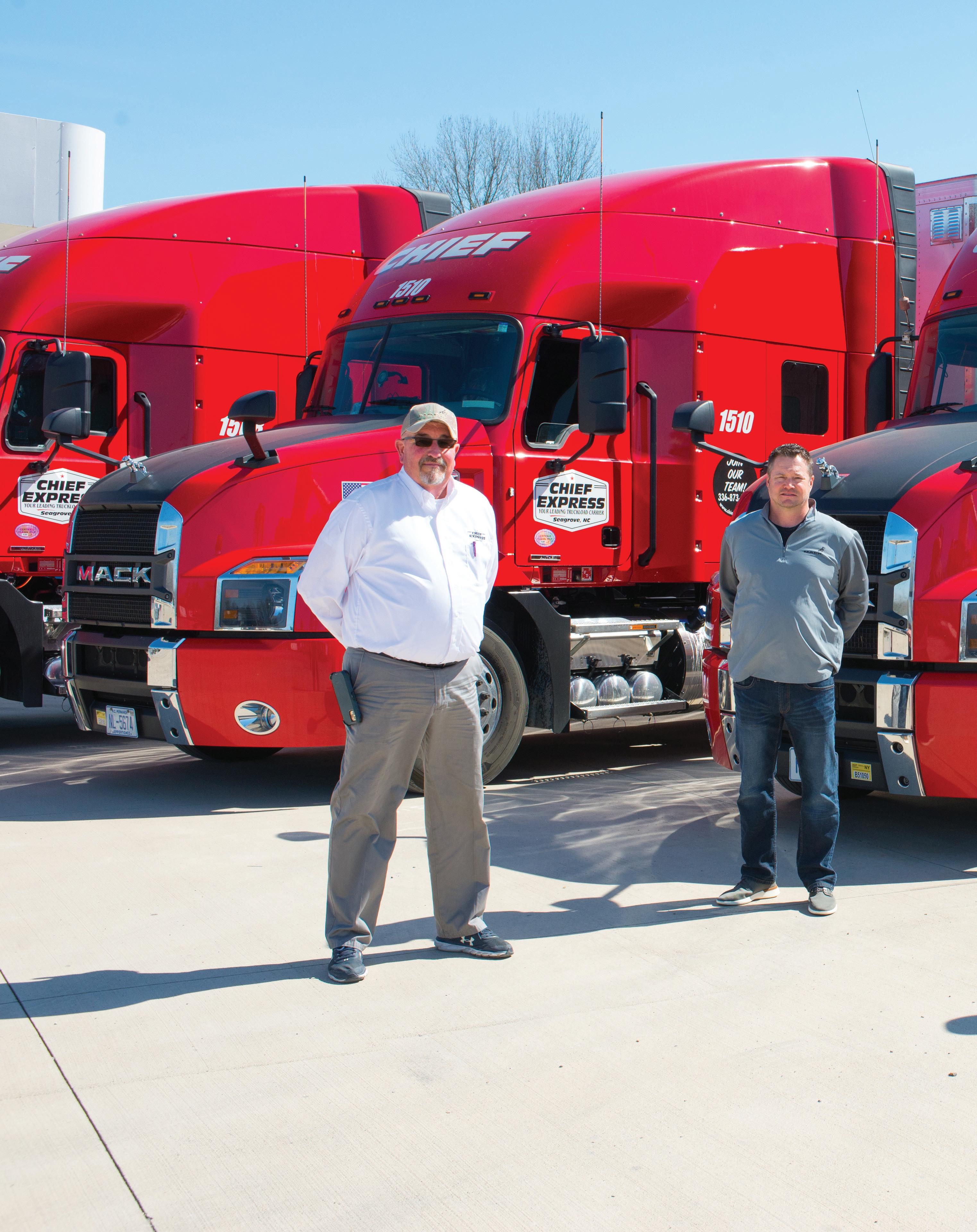
Chief Express chooses Mack Anthem® to power its growth
Asuccessful fleet is the result of choices. Choosing the right shippers, the right freight lanes and the right employees, for starters. Chief Express had a choice when it came to its trucks, and it chose the Mack Anthem® .
From its beginnings as a furniture hauler, Chief Express has grown into a diversified carrier while still catering to the small customer niche.
Kennan Hill, president and owner of the Seagrove, North Carolina-based fleet, started the company in 1995 in support of the family furniture manufacturing business. He started with one truck, grew the business and eventually left furniture manufacturing to run Chief Express full time. The fleet now has 75 tractors and more than 300 trailers, hauling in 34 states, mostly running out and back routes, with the furthest going to Dallas and Minneapolis.
In the early days, furniture was the mainstay of the fleet, “but then the recession hit and much of U.S.-based furniture
By Denise L. Rondini, photos by Kirk Zutell
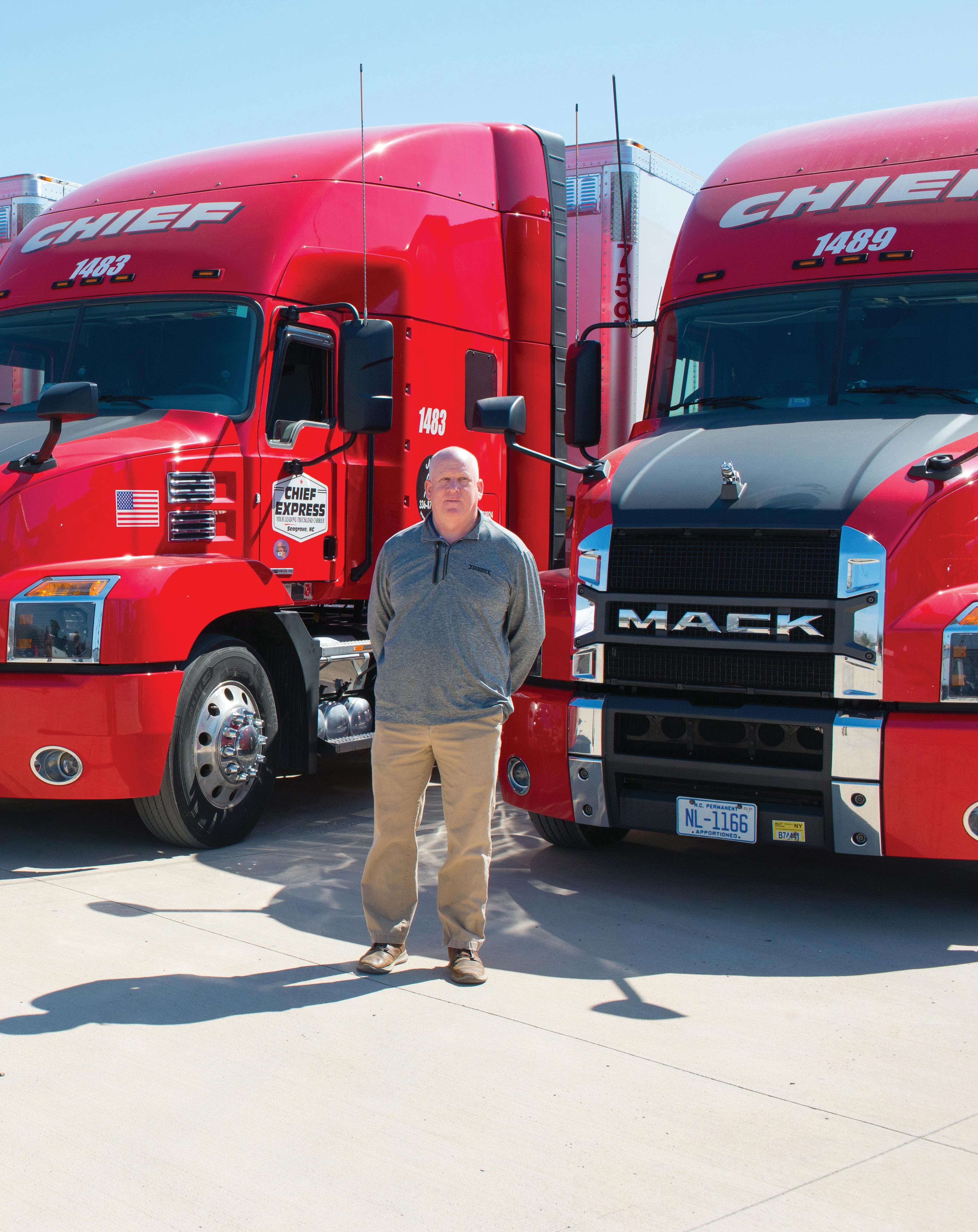
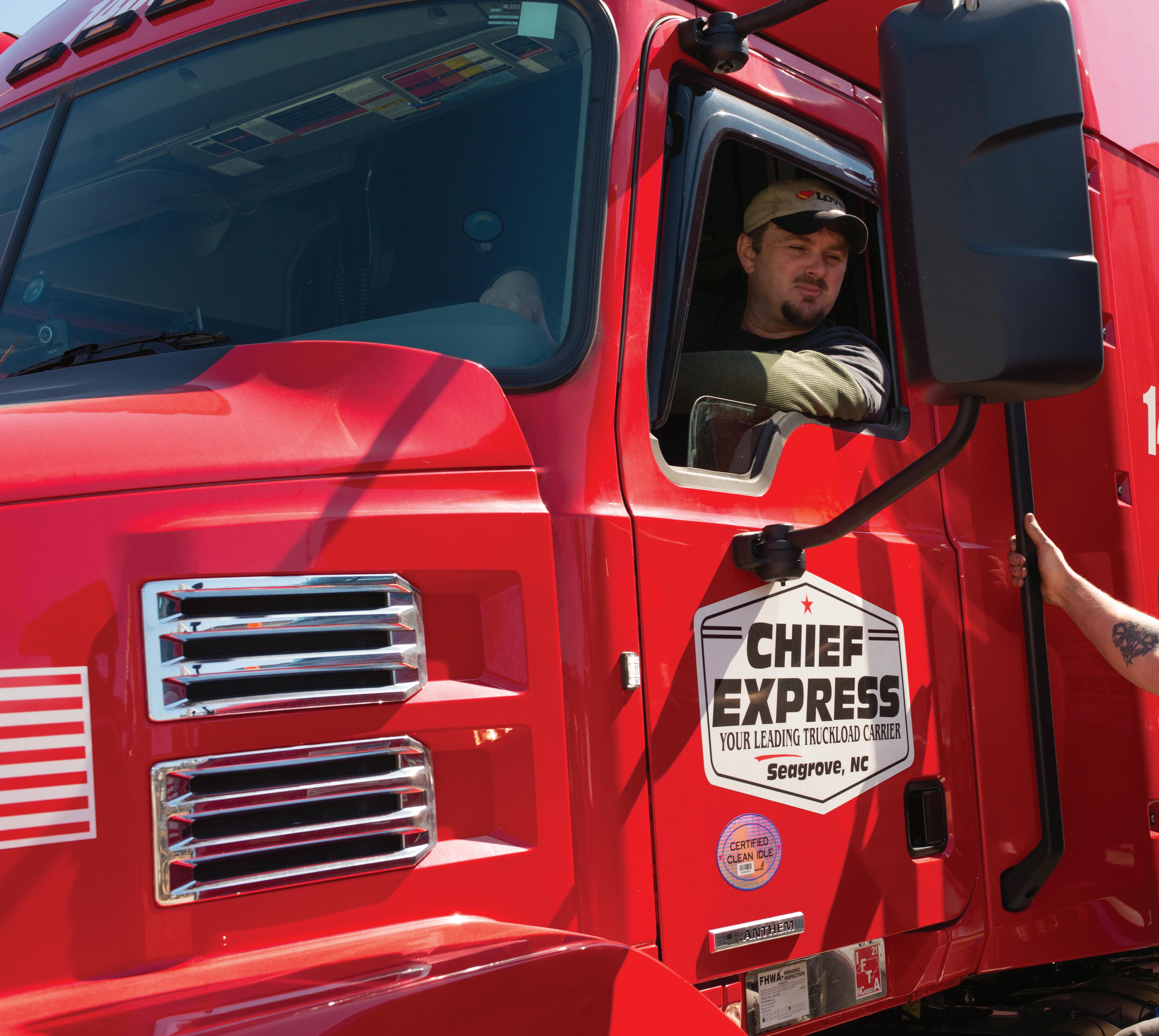
Mechanic Daniel Crabtree, sitting behind the wheel of a Chief Express Mack Anthem®, speaks with mechanic Josh Anderson.
manufacturing went overseas, so we had to start diversifying,” Hill says.
Today Chief Express still hauls furniture, but also dry food, tobacco, paper products, clothing, building materials and recycled products. “Because we are so diverse, when one area falls off another area usually picks up and that helps us stay profitable,” he says.
“We only have one thing to sell, and that is service. That is the only ‘product’ we have; we always deliver good service.” A big component to Chief Express delivering that good service is its trucks, 65 of which are Mack Anthem models. In the past, Chief Express operated other makes of trucks, but since 2013 has been adding Mack trucks to the point that within the next year the entire fleet will be Mack Anthems.
Its experience with the Anthem goes back further than most fleets. “We were lucky,” Hill says. “Mack came to us and asked us if we wanted to test the Anthem before it became
Kennan Hill, president and owner of Chief Express
available” (note: the Anthem was launched in 2017). “We said yes and so had an inside track on how good it would be.”
Chief Express drivers say they like the bold look and the finish of the Anthem. “The Anthem is a drivers’ truck.” Hill says. We had a lot of Pinnacles and the inside of the Anthem was a complete makeover. The new cab helped a lot of the bigger guys when the Anthem came out, both sleeper and cab. Everything became bigger and better, more insulated in the cab, everything was quieter, everything about it was an improvement.”
Chief Express has dialed in its spec over time and now has a sweet spot: 445 hp Mack MP®8 with a 12-speed overdrive Mack mDRIVE™
automated manual transmission and a 3.08 rear axle ratio. Chief Express transitioned to mDRIVE in 2017 and had a smooth switchover. “We haven’t had a stick in the fleet for a year or two,” Hill says.
“Drivers prefer Mack power over other trucks. Drivers would rather have the Mack over the competitors. The Anthem works better for us all the way round. We had other trucks, but they have not been as good.”
In fact, “The biggest challenge is when you have some guys who leave, and (then) come back, as we’ve had a few in the last couple of months. They know what we run and they’ll request a Mack. And they’ll have to drive something else until we get some more.”
Hill says the fleet prides itself on the appearance of its equipment and believes that the equipment itself is a great selling tool. “A person in a shipping department will see our trucks on the road and will contact us and ask us to see if we can handle their business or ask us to submit a quote.”
Hill was first introduced to Mack trucks by the local dealer, TranSource. Because Chief Express is a smaller fleet, Hill says they were having trouble getting good service at the dealerships for its previous makes of trucks. “We were seen as bait and not as the big fish in the pond,” he explains.
Chief Express does all its own maintenance in house, and technicians also like the Anthem’s advantages. Hill notes Anthem’s reliability and maintenance are good: “We seem to work on this less than other stuff over the years.”
Mack OneCall™ has been a reliable support for reducing and managing downtime, while TranSource provides the parts for fleet maintenance. “TranSource came in and offered us a good product at a good price, and were able to meet our service needs as far as getting us the parts we needed delivered when we needed them. That is how the relationship started.”
He adds, “TranSource has been a good partner to us. It seems like our success story is only getting better every year.”
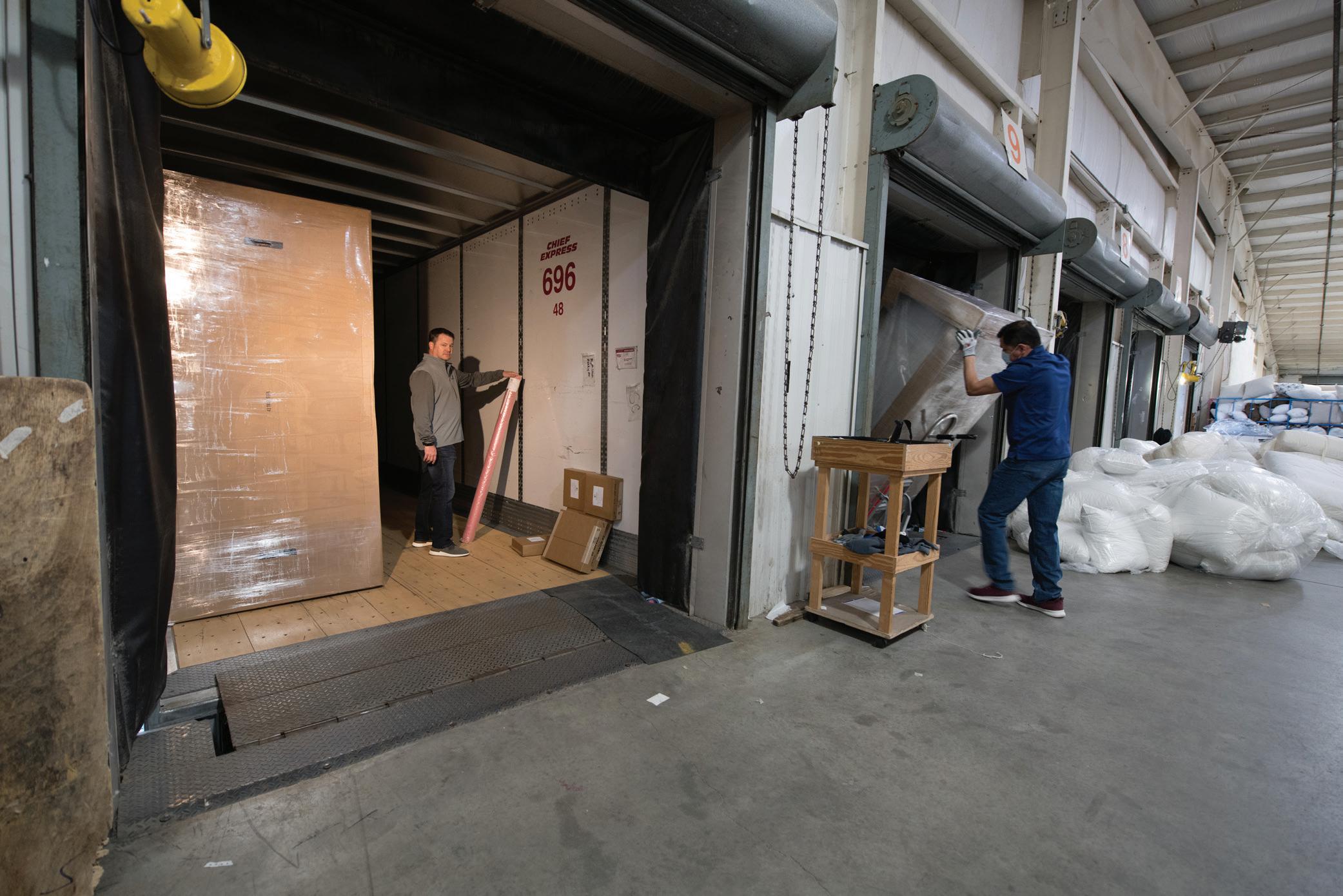

A partnership of support

Mike Limbaugh, founder of White Oak Transportation
White Oak Transportation supports its customers and credits its partnership with Mack for its success.
By Denise L. Rondini, photos by Kirk Zutell
Since White Oak Transportation started in 1999, Mike Limbaugh, founder, and his team have built the business by providing support for its clients and focusing on its niche, says Stan Mitchell, director of maintenance.
That niche — food grade products and medical products — kept the fleet quite busy during the COVID-19 pandemic as both of those industries were deemed essential businesses.
Headquartered in Decatur, Alabama, White Oak operates its 244 tractors and 1,200 trailers in regional haul in Alabama, Georgia, Florida, Mississippi, Arkansas, and Tennessee, and in over-the-road applications in Ohio, Kentucky, Louisiana and Texas.
Limbaugh has grown the business by supporting his clientele, Mitchell says. “He believes if you don’t take care of your customers someone else will, so he is driven by service and believes strongly in partnerships.”
Mitchell explains that if a White Oak customer needs something outside of what they already have contracted for — even if it not recurring business and even if it will not add significantly to the fleet’s bottom line — White Oak will accommodate the customer’s needs. “We take care of all their needs instead of just concentrating on one aspect of a contract.
“We take care of them as opposed to them having to build new relationships or find another carrier.” Limbaugh and his team work alongside customers to come up with solutions to customers’ problems. “And Mike is always available to both customers and employees.”
When Limbaugh started the business he did so with used vehicles. Today he operates 280 trucks and buys new trucks on a fiveyear/500,000-mile trade cycle.
Ninety percent of the fleet is Macks; primarily Mack Anthem® models with 70-inch walkthrough sleepers with single bunks. Their engine of choice is the MP®8 MaxiCruise, 12-speed mDRIVE™ and the Meritor MT40-14XHE.
Mitchell says they depend on the support of the Mack Uptime services, Mack Finance and the relationship between Nextran Truck Centers and the fleet.
Steve Gilmore, sales representative with Nextran Truck Centers, says he has the easy part of the White Oak relationship. “Taking care of White Oak is a team effort. I set goals everyday with the fleet managers, Nextran employees and the Mack Team. We

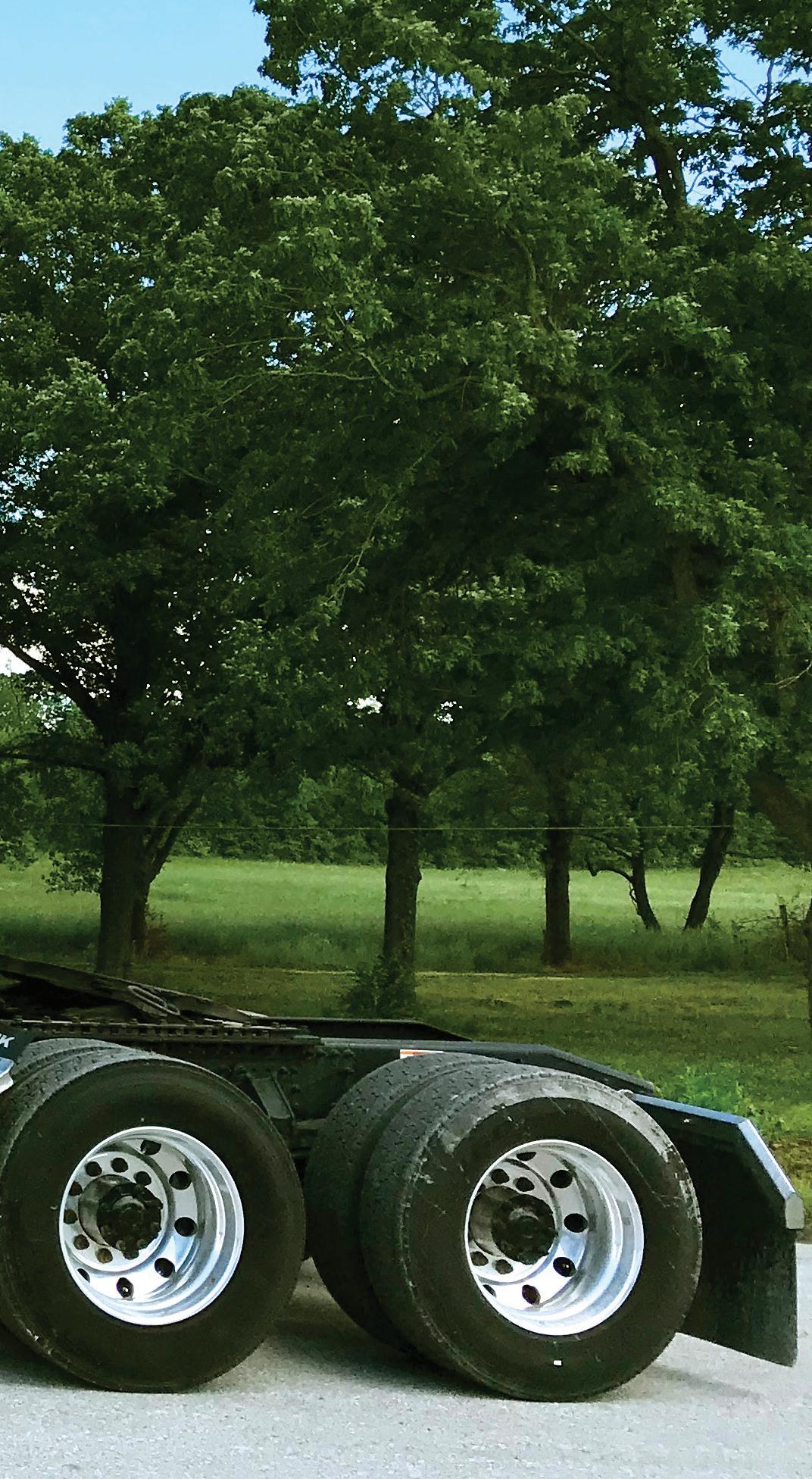
all work very hard to reach those goals.” “We worked in collaboration with Mack and used our historical maintenance information to determine a trade cycle that made sense for us,” Mitchell says. “And when I say worked with Mack I mean everyone at Mack including engineers, salespeople, service advisers, regional reps — everyone.”
He adds, “What we learned is that this is the peak trade-in cycle where we get the best out of our trucks. And we keep up on the maintenance so when we go to trade our units we get a higher trade value. Other fl eets are looking to buy White Oak units when they become available.”
The dedication to maintenance is part of the partnership of support White Oak has with Mack. White Oak participates in what Mitchell calls a pre-paid maintenance program that sets maintenance intervals and schedules and requires that maintenance be performed by a Certifi ed Mack Technician. In the case of White Oak this is a technician from its local dealership, Nextran, that works out of one of the service bays at White Oak’s location. “That is very convenient for us because we do not have to shuttle a truck 20 minutes away especially when you consider that sometimes that 20 minutes can stretch into an hour and a half,” Mitchell says.
He explains that the maintenance program means White Oak trucks gets seen more often. “You see the trucks more frequently and on a more consistent basis. I think the more you see the units the more investment you get in them from service advisers, your technicians, your drivers. Everyone involved with the truck becomes more invested in looking after it when they see it often. They become more invested in the performance of the unit.”
“Having good, well-maintained equipment has helped White Oak recruit and retain drivers,” Mitchell says. “I have heard drivers over and over, ‘If I am not rolling, I am not making money,’ so we do our best to keep them rolling.” Mitchell attributes the fl eet’s intense focus on maintenance as a reason its trucks — and drivers — keep rolling. “Preventive maintenance is pretty much mandated,” he says. “If you ignore maintenance, it will eat your lunch and leave your drivers so frustrated they will seek out other fl eets that have better equipment. Equipment is up there on the top of the list for retention of drivers.”
Mitchell credits Mack for playing a large role in the White Oak’s success. “I interact with the dealership multiple times a day and they play a large role in our operation and with Mack we have developed a partnership of support.”
He adds, “We’ve built a relationship to where if I call them they know I need something. These days everyone is stressed because of e-logs, COVID, fuel prices, etc. Having a partnership of support with our customers and with Mack helps us to keep doing our best.”
Stan Mitchell, director of maintenance for White Oak
